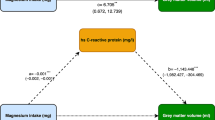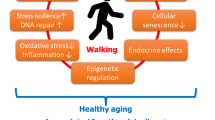Abstract
Objectives
Recent clinical trials suggested a potential benefit of dietary creatine on cognitive function for aging individuals. However, the association between creatine consumption from food and cognitive function in the older adults remained undetermined at the populational level. The present study quantified the amount of creatine consumed through a regular diet among U.S. adults aged 60 years and over, and evaluated the link between dietary creatine and cognitive function using data from the 2001–2002 National Health and Nutrition Examination Survey (NHANES).
Methods
NHANES 2001–2002 round included a total of 1340 older adults (51.8% women; age 71.4 ± 7.8 years) who provided valid dietary information and cognitive testing measures. Dietary intake information was obtained from the NHANES Dietary Data component through a 24-h in-person dietary recall interview. Cognitive function was assessed using the WAIS III Digit Symbol Substitution Test (DSS) conducted during the household interview.
Results
A bivariate model revealed a significant positive correlation between DSS scores and creatine intake across the whole sample (τb = 0.043; P = 0.02). The partial models demonstrated a significant correlation between creatine consumption and DSS score when adjusted for sociodemographic variables (r = 0.062; P = 0.039), and nutritional variables (r = 0.055; P = 0.049). The participants who consumed more than 0.95 g of creatine per day (3rd and 4th quartiles of creatine intake) were found to have higher scores on the cognitive functioning test as compared to their peers with lower creatine intake (1st and 2nd quartiles) (P < 0.05).
Conclusion
Our findings suggest that creatine from food might be protective against reduced cognitive performance in the older population. Further research is highly warranted to investigate the role of dietary creatine amount in cognitive function in the older adults.

Similar content being viewed by others
References
CDC. Subjective Cognitive Decline — A Public Health Issue. Page last reviewed: February 27, 2019. Available at: https://www.cdc.gov/aging/data/subjective-cognitive-decline-brief.html
Johansson MM, Marcusson J, Wressle E (2015) Cognitive impairment and its consequences in everyday life: experiences of people with mild cognitive impairment or mild dementia and their relatives. Int Psychogeriatr 27:949–958. https://doi.org/10.1017/S1041610215000058
Liang JH, Shen WT, Li JY et al (2019) The optimal treatment for improving cognitive function in elder people with mild cognitive impairment incorporating Bayesian network meta-analysis and systematic review. Ageing Res Rev 51:85–96. https://doi.org/10.1016/j.arr.2019.01.009
Handing EP, Small BJ, Reynolds SL et al (2015) Impact of dietary factors and inflammation on cognition among older adults. J Prev Alzheimers Dis 2:220–226. https://doi.org/10.14283/jpad.2015.50
Scarmeas N, Anastasiou CA, Yannakoulia M (2018) Nutrition and prevention of cognitive impairment. Lancet Neurol 17:1006–1015. https://doi.org/10.1016/S1474-4422(18)30338-7
McMorris T, Mielcarz G, Harris RC et al (2007) Creatine supplementation and cognitive performance in elderly individuals. Neuropsychol Dev Cogn B Aging Neuropsychol Cogn 14:517–528. https://doi.org/10.1080/13825580600788100
Avgerinos KI, Spyrou N, Bougioukas KI et al (2018) Effects of creatine supplementation on cognitive function of healthy individuals: a systematic review of randomized controlled trials. Exp Gerontol 108:166–173. https://doi.org/10.1016/j.exger.2018.04.013
Chen TC, Clark J, Riddles MK et al (2020) National Health and Nutrition Examination Survey, 2015–2018: Sample design and estimation procedures. Vital Health Stat 2:1–35
Brosnan JT, Silva RPD, Brosnan ME (2011) The metabolic burden of creatine synthesis. Amino Acids 40:1325–1331. https://doi.org/10.1007/s00726-011-0853-y
Bakian AV, Huber RS, Scholl L et al (2020) Dietary creatine intake and depression risk among U.S. adults. Transl Psychiatry 10:52. https://doi.org/10.1038/s41398-020-0741-x
USDA Agricultural Research Service, Food Surveys Research Group: Beltsville, MD. Food and Nutrient Database for Dietary Studies. Available from: http://www.ars.usda.gov/ba/bhnrc/fsrg Accessed 7 Jan 2021.
Anand J, Raper N, Tong A (2006) Quality assurance during data processing of food and nutrient intakes. J Food Compos Anal 19:S86–S90. https://doi.org/10.1016/j.jfca.2006.02.005
Wechler D (1997) Administration and Scoring Guide, WAIS – III, Wechsler Adult Intelligence Scale (3rd Edition). Harcourt Brace and Company, San Antonio
Corporation P (1997) WAIS-III WMS-III Technical Manual. Harcourt Brace and Company, San Antonio
Kanaya AM, Lindquist K, Harris TB et al Health ABC Study (2009) Total and regional adiposity and cognitive change in older adults: the Health, Aging and Body Composition (ABC) study. Arch Neurol 66:329–335. https://doi.org/10.1001/archneurol.2008.570
Jaeger J (2018) Digit symbol substitution test: the case for sensitivity over specificity in neuropsychological testing. J Clin Psychopharmacol 38:513–519. https://doi.org/10.1097/JCP.0000000000000941
Tucker KL (2016) Nutrient intake, nutritional status, and cognitive function with aging. Ann N Y Acad Sci 1367:38–49. https://doi.org/10.1111/nyas.13062
Alves CR, Merege Filho CA, Benatti FB et al (2013) Creatine supplementation associated or not with strength training upon emotional and cognitive measures in older women: a randomized double-blind study. PLoS ONE 8:e76301. https://doi.org/10.1371/journal.pone.0076301
Dechent P, Pouwels PJ, Wilken B et al (1999) Increase of total creatine in human brain after oral supplementation of creatine-monohydrate. Am J Physiol 277:R698-704. https://doi.org/10.1152/ajpregu.1999.277.3.R698
Ostojic SM (2021) Dietary creatine intake in U.S. population: NHANES 2017–2018. Nutrition. https://doi.org/10.1016/j.nut.2021.111207
Funding
None received.
Author information
Authors and Affiliations
Corresponding author
Ethics declarations
The study procedures were structured in line with the Declaration of Helsinki.
Conflict of Interest
S.M.O. serves as a member of the Scientific Advisory Board on creatine in health and medicine (AlzChem LLC). S.M.O. owns patent “Sports Supplements Based on Liquid Creatine” at European Patent Office (WO2019150323 A1), and active patent application “Synergistic Creatine” at UK Intellectual Property Office (GB2012773.4). S.M.O. has served as a speaker at Abbott Nutrition, a consultant of Allied Beverages Adriatic and IMLEK, and an advisory board member for the University of Novi Sad School of Medicine, and has received research funding related to creatine from the Serbian Ministry of Education, Science, and Technological Development, Provincial Secretariat for Higher Education and Scientific Research, AlzChem GmbH, KW Pfannenschmidt GmbH, and ThermoLife International LLC. S.M.O. is an employee of the University of Novi Sad and does not own stocks and shares in any organization. D.K. and V.S. declare no conflict of interest.
Ethical approval
The ethical approval to conduct the NHANES 2001–2002 was granted by the NHANES Institutional Review Board (Protocol #98-12).
Statement of human and animal rights
The study procedures were structured in line with the Declaration of Helsinki.
Informed consent
The informed consent was obtained from all participants.
Additional information
Publisher's Note
Springer Nature remains neutral with regard to jurisdictional claims in published maps and institutional affiliations.
Rights and permissions
About this article
Cite this article
Ostojic, S.M., Korovljev, D. & Stajer, V. Dietary creatine and cognitive function in U.S. adults aged 60 years and over. Aging Clin Exp Res 33, 3269–3274 (2021). https://doi.org/10.1007/s40520-021-01857-4
Received:
Accepted:
Published:
Issue Date:
DOI: https://doi.org/10.1007/s40520-021-01857-4




